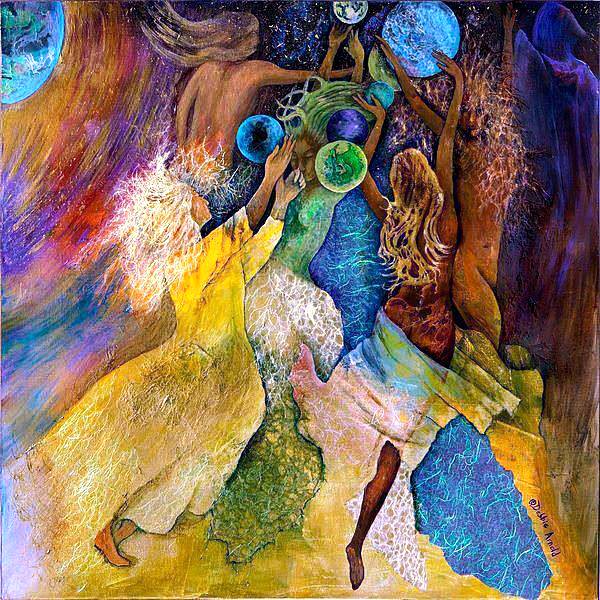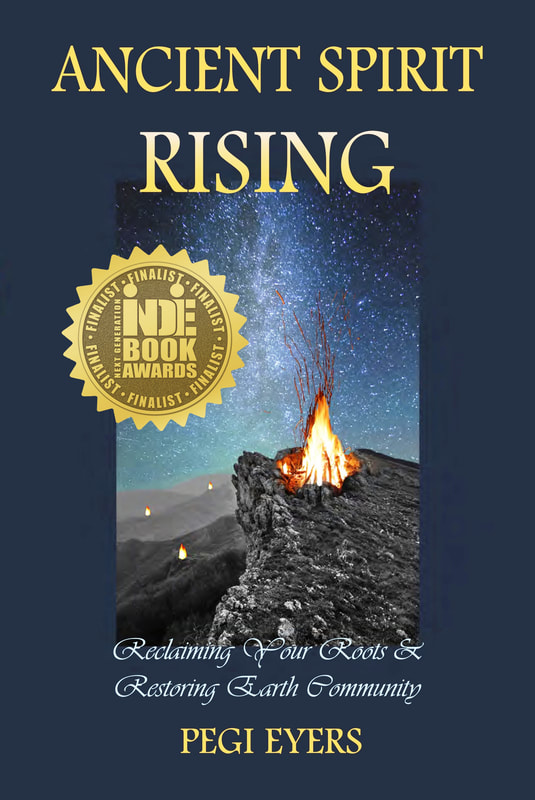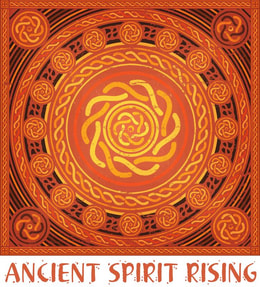PEGI EYERS
As societal problems worsen and environmental degradation intensifies, re-landing ourselves in place is rapidly becoming an essential component of a post-colonial future. In fact, the revival of bioregionalism, our collective eco-awareness and other revolutionary acts, will defy the nationalism, capitalism and materialism of hegemonic Empire. At the intersection of our bonds to place, contradictions arise in our relationship to the original First Nations, our status on the land, and locating earth-rooted culture. How do Settlers reconnect to earth-emergent patterns here on Turtle Island?
Engaging successfully with the uncolonizing process both in ourselves and others will naturally lead to a reciprocity with Earth Community, and a myriad of resources are available for these “future primitive” forms of self-identity. We can follow paths such as animism or ecopsychology, or narrow our focus along ethnocultural lines. Yet for those of us of European descent, it may not be clear where our own ancestral knowledge is located. Empire is the great leveler of all cultural diversity, and as the multi-generational members of the Canadian or American nation-state and beneficiaries of white privilege, is it even plausible to imagine ourselves as i.e. Celtic, Baltic or Nordic peoples once again? Instead of homogeneity and the default of whiteness, can we embrace our own heritage and the ancestral arts as acts of interruption and resistance?
As the paradigm continues to shift, many Turtle Island First Nation visionaries, academics and activists are inviting Settlers to “reindigenize” ourselves to our local bioregions. This mandate suggests a review of the Settler use of the term “indigenous” as a marker of self-identity, and highlights the need for a strong moral code and a solid understanding of social justice. How do we embrace time-tested First Nations values and traditional ecological knowledge (TEK) while respecting boundaries? What is the difference between cultural exchange and cultural appropriation? As Settlers, our uncolonization must go hand-in-hand with taking responsibility to undo the damage leveled against people of colour in the Americas by white supremacy, genocide, slavery, eco-fascism, oppression and assimilation.
Organizing against Settler-Colonialism in our time, we can work to establish the equity that will lead to equality, as well as creating opportunities for reconciliation, restitution and emergent solidarities. Understanding how we have all inherited trauma from colonization, and stopping the "cycles of harm" will lead to healing and collective liberation. Working toward mutual anti-colonial futures and resilience in times of massive change, we must also consider the possibilities of the commons, peaceful co-existence on the land, a diversity of ancestral wisdom(s), and earth remediation.
Engaging successfully with the uncolonizing process both in ourselves and others will naturally lead to a reciprocity with Earth Community, and a myriad of resources are available for these “future primitive” forms of self-identity. We can follow paths such as animism or ecopsychology, or narrow our focus along ethnocultural lines. Yet for those of us of European descent, it may not be clear where our own ancestral knowledge is located. Empire is the great leveler of all cultural diversity, and as the multi-generational members of the Canadian or American nation-state and beneficiaries of white privilege, is it even plausible to imagine ourselves as i.e. Celtic, Baltic or Nordic peoples once again? Instead of homogeneity and the default of whiteness, can we embrace our own heritage and the ancestral arts as acts of interruption and resistance?
As the paradigm continues to shift, many Turtle Island First Nation visionaries, academics and activists are inviting Settlers to “reindigenize” ourselves to our local bioregions. This mandate suggests a review of the Settler use of the term “indigenous” as a marker of self-identity, and highlights the need for a strong moral code and a solid understanding of social justice. How do we embrace time-tested First Nations values and traditional ecological knowledge (TEK) while respecting boundaries? What is the difference between cultural exchange and cultural appropriation? As Settlers, our uncolonization must go hand-in-hand with taking responsibility to undo the damage leveled against people of colour in the Americas by white supremacy, genocide, slavery, eco-fascism, oppression and assimilation.
Organizing against Settler-Colonialism in our time, we can work to establish the equity that will lead to equality, as well as creating opportunities for reconciliation, restitution and emergent solidarities. Understanding how we have all inherited trauma from colonization, and stopping the "cycles of harm" will lead to healing and collective liberation. Working toward mutual anti-colonial futures and resilience in times of massive change, we must also consider the possibilities of the commons, peaceful co-existence on the land, a diversity of ancestral wisdom(s), and earth remediation.
| Read more on social justice, ethnocultural recovery, Settler re-landing, rewilding, ancestral connection, sacred land and animism in "Ancient Spirit Rising: Reclaiming Your Roots & Restoring Earth Community" by Pegi Eyers. Available from Stone Circle Press or Amazon |



